by Nicole Speulda

Images of war protesters on college campuses have given rise to a common perception that younger people tend to be pacifists. After all, is it not the young whose lives and health are most on the line in any military action? Yet, nearly four decades of survey data show a far more complex and often contradictory reality than does the popular hawk/dove dichotomy.
There is a generation gap over U.S. military interventionsbut it is older Americans, not young people, who typically show the greatest wariness about using military force. This was evident during the war in Vietnam and remains the case today. Pew surveys now show that roughly half of those in every age groupexcept for those ages 50 to 64 believe the decision to go to war in Iraq was right. And until recently, senior citizens were the least enthusiasticlast fall, for example, just 39% of those ages 65 and over felt it was right to go to war, while 50% said it was wrong.
While young people are at least as supportive of the war as those in other age groups, they are also more likely to support efforts to secure peaceful resolutions through diplomacy and multilateral approaches as well as humanitarian interventions abroad. Americans under age 30 also give priority to domestic concerns over foreign policy in matters of governance.
Consistent Pattern
The generation gap in attitudes toward using force in Iraq was greater in the months leading up to the war. A Pew Research Center commentary analyzing data from August through September of 2002 found solid majorities in every age cohort between 18 and 64 – including 69% of those under age 30 – in favor of taking military action in Iraq. But those in the oldest age cohort – ages 65 and older – were considerably more wary of using force; just 51% were in favor while 31% were opposed.

It is not only in the latest Iraq war that younger and older people have disagreed about the use of military force. In 1990, following Iraq’s invasion of Kuwait, 70% of people under age 30 favored military action against Iraq if economic sanctions failed, compared with just 52% of those ages 50 and older. And on the eve of war in January 1991, young people favored military action over giving sanctions more time by a 54% to 40% margin. People age 50 and older were evenly divided (45% to 45%). It was the older generation that worried most about U.S. forces sustaining high numbers of casualties.
In the 1990s, the use of U.S. troops for peacekeeping missions divided generations. Times-Mirror Center surveys conducted in 1994 posited potential scenarios in which U.S. forces might be used.
In every situation, Americans ages 65 and older were far less willing to support the deployment of U.S. ground forces. These scenarios envisioned such purposes as sending troops to prevent famines, restore law and order in Asian or African countries if their governments completely broke down, or dispatching troops to the Middle East to make sure that U.S. oil supplies would not be cut. Younger people were more likely to support the use of air power in these hypothetical scenarios as well. Citing such observations in a 1995 Aspen Institute report, “The United States and the Use of Force in the Post-Cold War Era,” Andrew Kohut and Robert Toth concluded that interventionists were much more likely to be found among Americans under the age of 30.1
During the Vietnam War, Gallup surveys showed that not only were older people less supportive of President Lyndon Johnson’s Vietnam policies early on, but they also were more likely to say the United States made a mistake in sending troops to fight there. In August 1965, just 41% of those ages 50 and older approved of Johnson’s handling of the Vietnam situation. Americans under age 30 were far more positive toward Johnson’s performance on Vietnam (56% approval).
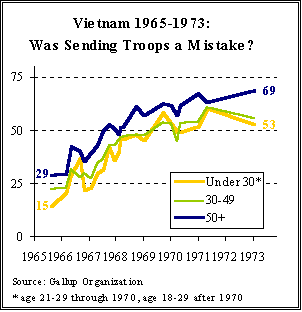
The generation gap in attitudes toward the Vietnam War did not erode over time. Gallup surveys conducted between 1965 and 1973 show that over time people of all ages increasingly expressed the view that U.S. involvement in Vietnam was a mistake, but the broadest criticism always came from older generations. In August of 1965, people ages 50 and older were already twice as likely as those under 30 (by a 29% to 15% margin) to say sending troops to Vietnam was a mistake. Nearly eight years later, as U.S. forces were about to be completely withdrawn, majorities in all age groups saw Vietnam as a mistake, but younger people remained far less likely to take this view (53%) than those age 50 and older (69%).2
How Best to Ensure Peace
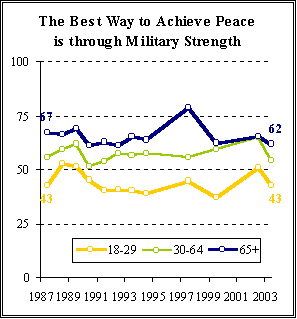
Older Americans are more opposed to the use of military force than those in other age groups, but most believe that, in principle, the best way to ensure peace is through military strength rather than effective diplomacy. Americans under age 30 generally favor the opposite approach. Since 1987, the belief in military strength as the best way to ensure peace has never fallen below 60% among those ages 65 and older, while on average only 44% of younger Americans subscribe to that opinion.
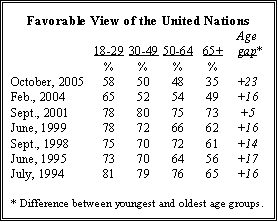
Younger people also have a much more favorable opinion of the United Nations than do older Americans and are more likely to say that the international body has a good influence on the way things are going in the United States. Even today, at a time when the public’s ratings of the U.N. are at record lows, young people hold the international organization in relatively high esteem. Today fully 58% of those under 30 say they have a favorable opinion of the U.N., while just 35% of those ages 65 and older say the same. The same generational difference is seen in a 2002 survey that showed a quarter of young people saying the United Nations was having a very good influence on the way things are going in the United States compared with only 14% of those over 65 who said so.
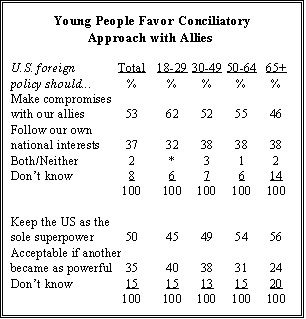
By the same token, the young are also more likely to favor a cooperative approach to foreign policy, and express less concern about maintaining America’s sole superpower status. In a December 2004 survey fully 62% of those under age 30 said U.S. foreign policy should take into account the interests of its allies even if it means making compromises with them. Fewer than half (46%) of those ages 65 and older said the same. And in Pew’s latest foreign policy survey, conducted Oct. 12-24, young respondents were divided over whether U.S. foreign policy should try to keep it so that America is the only military superpower (45%) or whether it would be acceptable if another country became as powerful as the U.S. (40%). By contrast, those ages 65 and older favored preventing the emergence of rival superpowers by more than two-to-one (56% to 24%).
Age Gap on Military Service
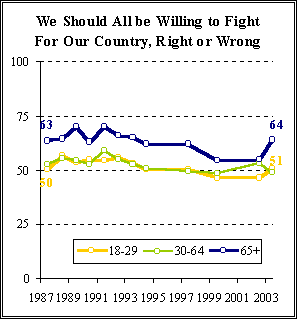
Despite their wariness of U.S. military action, older Americans are more likely than those in younger age groups to hold the view that “we should all be willing to fight for our country, whether it is right or wrong.” In August 2003, 64% of those over 65 supported this tenet, while barely half (51%) of those under age 30 agreed. This gap has persisted since the late 1980s .
Young People Back Free Trade…
Younger age cohorts are not only more likely to be defenders of international agreements but also to express concern about the protection of innocents abroad. Pew’s survey in October did not show obvious generation gaps in the way age groups ranked the importance of such issues as preventing nuclear war, protecting the United States from future terrorist attacks and ensuring adequate energy supplies. But the issue of “Helping improve the living standards in developing nations” was accorded top priority by 38% among those under the age of 30, compared with just 28% of those ages 65 and older, and younger people also place a significantly higher priority on reducing AIDS and other infectious diseases. In this same vein, young people are consistently less likely than older people to subscribe to the view that “most of the countries that have gotten help from America end up resenting us.”
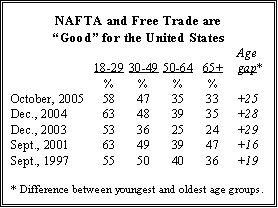
This internationalist view extends to trade agreements as well. In October 2005, nearly six-in-ten (58%) young people said that free trade agreements such as NAFTA are a good thing for the country; only 35% of people ages 50-64 and 33% of those over age 65 agreed – a difference observed consistently in surveys since 1997.
Younger people also tend to be much more supportive of international trade in general, seeing it as a good thing both for the country and for themselves and their families. In a 2002 Pew survey, 27% of those under 30 said growing trade and business ties with other countries are a very good thing for them personally, whereas only 12% of those over 65 said so.
But Want to Take Care of Problems at Home
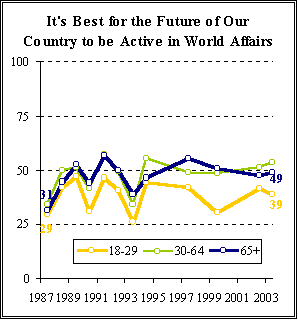
While younger Americans desire a multilateral approach to foreign affairs and are willing to engage military forces more readily to solve a wide range of international problems, their core instinct is to take care of problems at home first. Most (54%) young people agree with the statement “the U.S. should mind its own business internationally and let other countries get along the best they can on their own” – just 42% disagree. By comparison, majorities in all older age groups disagree.
Similarly, when given the choice of two governing principles, “It’s best for the future of our country to be active in world affairs” or “We should pay less attention to problems overseas and concentrate on problems here at home,” younger people prefer to focus on their own country. In 2003, only 39% of those under age 30 thought it best to be active, while 53% of those ages 30-64 and nearly half (49%) of those 65 and older preferred international activism.
Birds of a Different Feather
The foreign policy views of neither younger nor older Americans can be captured in a single word, particularly not by such generalizations as “hawks” or “doves.” The caution that older Americans express on any specific question about sending U.S. troops overseas belies their clear sense that maintaining America’s military strength and superpower status is the best way to keep us – and the rest of the world – safe. The youngest Americans generally prefer effective diplomacy over military strength as the best way to foster peace – but are not notably opposed to using military force in specific circumstances. Who, then, are the hawks and who are the doves? And if the young support international engagement only when problems at home have been addressed first, but want to work with allies through international institutions, while older generations see global affairs as more important but see America’s interests taking priority over international cooperation, who are the isolationists and who are the internationalists?
These seeming paradoxes, however, have their own internal logic. For example, it is not necessarily inconsistent to insist that America remain the world’s only superpower and to see military strength as the best way to achieve peace, yet at the same time to be exceedingly cautious about the application of military force – as is the position of many older Americans. Similarly, while younger people believe America’s best approach to foreign policy is through cooperation and compromise, they also see the use of military force as a tool in the foreign policy toolbox – a practical and tough-minded way to achieve a compassionate end.
Some of these differences across age groups may be explained by the nature of the life cycle – and as today’s youth grow older their views may take on the characteristics of their seniors today. Some may also reflect generational divides – views that are shaped by the events and experiences they share such as World War II, Vietnam, and the end of the Cold War. Only by tracking their opinions of future conflicts will we be able to see if, as today’s young adults grow older, their ideas about these issues change as did those of their forebears.
Notes
1 “The United States and the Use of Force in the Post-Cold War Era,” The Aspen Institute, Queenstown, Maryland: 1995.
2 The consistent generational pattern in views of the Vietnam and Iraq wars stands in stark contrast to an analysis of partisan divides. Partisanship was never a major factor in views of the Vietnam conflict – Gallup surveys show that at the outset majorities in both parties said sending troops was correct, and by the end majorities in both parties said it was a mistake, and the partisan gap never widened beyond 10 percentage point.




